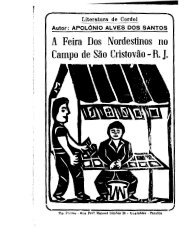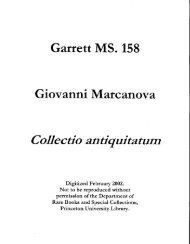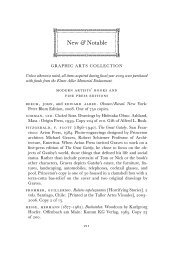- Page 1 and 2: princeton university library chroni
- Page 3 and 4: The Seferis-Keeley Correspondence,
- Page 5 and 6: Edmund Keeley, 1968 568 George Sefe
- Page 7 and 8: George Seferis at Aghios Ilarion, C
- Page 9 and 10: 3 Remember the baths where you were
- Page 11 and 12: 15 Sleep wrapped you in green leave
- Page 13 and 14: George Seferis and Edmund Keeley in
- Page 15 and 16: literary fields. In the case of mod
- Page 17 and 18: phy, 8 and Byzantine Studies 9 in A
- Page 19 and 20: esources in post-Classical Greek St
- Page 21 and 22: Ambassador George Seferiades and Mr
- Page 23 and 24: George Seferis in 1967. Photograph
- Page 25 and 26: everywhere with us everywhere with
- Page 27 and 28: Helen 1 by george seferis translate
- Page 29: Great suffering had desolated Greec
- Page 33 and 34: George Seferis in the patio of his
- Page 35 and 36: freedom, justice, and human dignity
- Page 37 and 38: A pine tree near the Church of the
- Page 39 and 40: ecause the pine trees will vanish,
- Page 41 and 42: of the Classics at Cambridge, who w
- Page 43 and 44: A fragment of a statue of Aphrodite
- Page 45 and 46: eports, with evident pride, that I
- Page 47 and 48: doned sequence once called “Notes
- Page 49 and 50: Sikelianos that he had translated f
- Page 51 and 52: when Seferis evidently decided that
- Page 53 and 54: 1961 The principal issue that comes
- Page 55 and 56: Dust jacket of Six Poets of Modern
- Page 57 and 58: George Seferis (right) receiving th
- Page 59 and 60: the translation. I agreed to do so
- Page 61 and 62: had been thoroughly rediscovered by
- Page 63 and 64: living spiritual tradition of Greec
- Page 65 and 66: a detailed proposal from Princeton
- Page 67 and 68: that, since he is not “an expert
- Page 69 and 70: George Seferis (left), with Princet
- Page 71 and 72: It is clear from my letters in the
- Page 73 and 74: anthology reprinting translations o
- Page 75 and 76: cussed the Foreword with Seferis an
- Page 77 and 78: their rich complexity, so dependent
- Page 79 and 80: Moralis discoloration.” My explan
- Page 81 and 82:
do this was Seferis’s remark, in
- Page 83 and 84:
Christians” promulgated by the Co
- Page 85 and 86:
Photograph © by Jill Krementz Geor
- Page 87 and 88:
1969-1970 During these two years my
- Page 89 and 90:
Draft of the translation by Edmund
- Page 91 and 92:
the poet was apparently in trouble,
- Page 93 and 94:
of his poems (e.g., his comments on
- Page 95 and 96:
— not just the selection of trans
- Page 97 and 98:
lized cemetery crowded? People conv
- Page 99 and 100:
Suddenly I was walking and did not
- Page 101 and 102:
The ship’s bell struck like a coi
- Page 103 and 104:
The Seferis-Keeley Correspondence,
- Page 105 and 106:
expect that the above became appare
- Page 107 and 108:
interested in the extent these symb
- Page 109 and 110:
such intensity over the past year o
- Page 111 and 112:
people. I would like to have a copy
- Page 113 and 114:
Helen. 19 Tzelatis 20 (executioner)
- Page 115 and 116:
(8) What Do Our Souls Seek Journeyi
- Page 117 and 118:
Department of English Hon. George S
- Page 119 and 120:
Department of English Hon. George S
- Page 121 and 122:
Department of English + princeton u
- Page 123 and 124:
Department of English + princeton u
- Page 125 and 126:
+ Aérogramme Department of English
- Page 127 and 128:
+ 456 c/o Mr. Bruce Lansdale 54 Ame
- Page 129 and 130:
which would be a complicated busine
- Page 131 and 132:
2 K. of Asine terrible 68 willow tr
- Page 133 and 134:
g) Thrush h) Ayanapa I i) engomi +
- Page 135 and 136:
+ american academy in rome via ange
- Page 137 and 138:
Department of English McCosh 22 + p
- Page 139 and 140:
it to any I have ever been stamped
- Page 141 and 142:
Department of English McCosh 22 + p
- Page 143 and 144:
Department of English McCosh 22 + p
- Page 145 and 146:
ecompense that you deserve for your
- Page 147 and 148:
has been a mournful, harshly self-c
- Page 149 and 150:
+ Aérogramme Department of English
- Page 151 and 152:
had come to much the same revised t
- Page 153 and 154:
Department of English McCosh 22 Dea
- Page 155 and 156:
highest quality in printing as well
- Page 157 and 158:
Department of English McCosh 22 + p
- Page 159 and 160:
Perhaps some day we will come toget
- Page 161 and 162:
Department of English McCosh 22 + p
- Page 163 and 164:
Many thanks for the Stockholm lectu
- Page 165 and 166:
period of rest — it might not be
- Page 167 and 168:
it comes from you; that too is sign
- Page 169 and 170:
Leitch’s follow-up letter, mailed
- Page 171 and 172:
Guest House 183 are fine. If it doe
- Page 173 and 174:
in having you, though they may feel
- Page 175 and 176:
— sometimes frightening — ident
- Page 177 and 178:
Spring has not yet arrived here, wh
- Page 179 and 180:
ever happens to come up in our gard
- Page 181:
not quite certain from your letter
- Page 184 and 185:
there is any doubt about this, plea
- Page 186 and 187:
I understand that the other two mem
- Page 188 and 189:
that from July 20 on I will be gone
- Page 190 and 191:
ductory pieces of the book. I hope
- Page 192 and 193:
there was anything in the Foreword
- Page 194 and 195:
4. Boris Pasternak: Fifty Poems, tr
- Page 196 and 197:
+ 525 Delphi, 9.2.67 240 Dear Micha
- Page 198 and 199:
Draft of a translation by Mary Keel
- Page 200 and 201:
versity has decided finally to save
- Page 202 and 203:
chance to talk about this after we
- Page 204 and 205:
and please include typewritten card
- Page 206 and 207:
the “your” to “our” was the
- Page 208 and 209:
praying that no major obstacle will
- Page 210 and 211:
I go off to the repair man before t
- Page 212 and 213:
+ george seferis, agras 20, athens
- Page 214 and 215:
We must someday talk about the Harv
- Page 216 and 217:
dishes, silverware, kitchen utensil
- Page 218 and 219:
I will (if they allow me) actually
- Page 220 and 221:
program of your October Symposium.
- Page 222 and 223:
+ 551 69. xi. 16 Dear Michalaki —
- Page 224 and 225:
General remark: Ask your very kind
- Page 226 and 227:
+ princeton university creative art
- Page 228 and 229:
+ Gseferis /Agras, 20 / Athens 502
- Page 230 and 231:
will survive the spring without Ath
- Page 232 and 233:
+ princeton university 351 creative
- Page 234 and 235:
+ Aérogramme 140 Littlebrook Road
- Page 236 and 237:
+ george seferis, agras 20, athens
- Page 238 and 239:
like to do a book of yours. Perhaps
- Page 240 and 241:
George Seferis in 1968, at the time
- Page 242 and 243:
just manage to bear up. I have good
- Page 244 and 245:
how, do what you can to allow both
- Page 246 and 247:
His Excellency George Seferiades, 2
- Page 248 and 249:
Mr. George Seferis 20 Agras Street
- Page 250 and 251:
publisher. This would be desirable
- Page 252 and 253:
efore you would feel perfectly free
- Page 254 and 255:
+ george seferis, agras 20, athens
- Page 256 and 257:
Since English is more widely read t
- Page 258 and 259:
+ george seferis, agras 20, athens
- Page 260 and 261:
freedom of speech. But alas, I feel
- Page 262 and 263:
efore our parting. During my goodby
- Page 264 and 265:
+ 593 160 Mercer Street Princeton,
- Page 266 and 267:
Times about your friend McCarthy, w
- Page 268 and 269:
fine example of Roman official ideo
- Page 270 and 271:
or late is debated. Fragments are p
- Page 272 and 273:
man in a tree holding a rooster. It
- Page 274 and 275:
impressive, however, are the many b
- Page 276 and 277:
Hibben, John G., Winter, 273-310, 2
- Page 278 and 279:
princeton university library chroni
- Page 280:
friends of the princeton university















